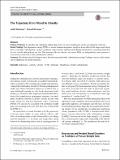The Trajectory from Mood to Obesity
Author(s)
Wurtman, Judith; Wurtman, Richard; Wurtman, Richard Jay
Download13679_2017_Article_291.pdf (383.6Kb)
PUBLISHER_CC
Publisher with Creative Commons License
Creative Commons Attribution
Terms of use
Metadata
Show full item recordAbstract
Purpose of Review
To describe and explain the relationships between mood disturbances and the development of obesity.
Recent Findings
That depression, anxiety, PTSD, or severe stresses can promote obesity as a side-effect of the drugs used to treat them, or through “carbohydrate craving” to enhance brain serotonin synthesis and alleviate dysphoria by consuming foods that are rich in both carbohydrates and fats. That seasonal affective disorder and severe PMS can independently cause patients to overconsume foods rich in both carbohydrates and fats.
Summary
The obesity caused by drugs or mood disorders associated with “carbohydrate craving” leading to excess calorie intake can be suppressed by dietary measures. Keywords: Depression; Anxiety; Obesity; PTSD; Serotonin; Weight gain; Dietary carbohydrates
Date issued
2018-03Department
Massachusetts Institute of Technology. Department of Brain and Cognitive SciencesJournal
Current Obesity Reports
Publisher
Springer-Verlag
Citation
Wurtman, Judith, and Richard Wurtman. “The Trajectory from Mood to Obesity.” Current Obesity Reports 7, 1 (December 2017): 1-5 © 2017
The Author(s)
Version: Final published version
ISSN
2162-4968